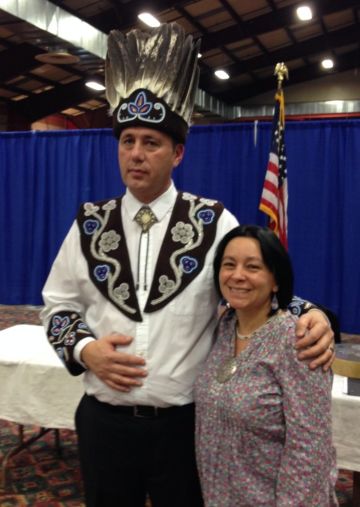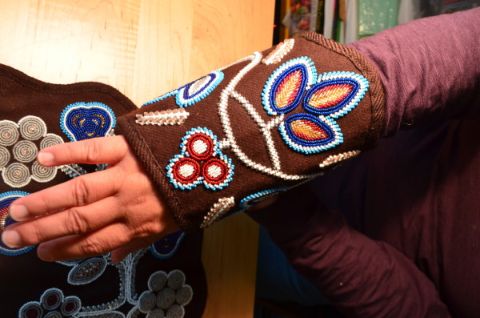 |
Canku Ota
|
 |
|
(Many Paths)
|
||
|
An Online Newsletter
Celebrating Native America
|
||
|
July 2015 - Volume 13
Number 7
|
||
|
|
||
|
Anthropologist Artist
Brings Penobscot Artifact To Life
|
||
|
by Robin Clifford Wood,
special to the Bangor (Maine) Daily News
|
||
Jennifer Sapiel Neptune — artist, anthropologist, educator and member of the Penobscot Nation — has integrated her myriad skills to intertwine the past and the present, giving life to the future of her community. Her most recent reproduction from Penobscot history was a ceremonial headdress, cuffs and a collar, hand-decorated with intricate beadwork. It took Jennifer hundreds of hours to make the pieces, but the craft was only part of the job. It also was important to infuse the three garments with the spirit of their heritage. So Jennifer embarked upon a journey with them, all over the state of Maine. I first met Jennifer four years ago, when I wrote a story about her basketry. Jennifer has been interested in artifacts and historic, native craftwork since her youth. “As a teenager I went to the [University of Maine] library and read Native American books about my tribe and others," she said. “There were these amazing black-and-white photographs of beadwork and baskets. I wanted to see them in color. I wanted to make them." Jennifer enrolled at the University of Maine as an anthropology major with the express purpose of being allowed access to the native artifacts in the collections of the Hudson Museum. “I could see and touch them and really study them," she said. One of the artifacts in the museum's collection is the original collar and cuffs that served as Jennifer's model, made around 1870 and worn by Penobscot chiefs in the early 20th century. In recent years, the tribe has borrowed the artifacts to lie on a table during ceremonies, but they are too delicate to be worn. Jennifer's work has given her community a living facsimile of their traditional sacred garments, made of brown wool cloth and decorated with tens of thousands of glass beads. The beads give the items substantial weight. That is no accident. “The collar symbolizes that the weight of our community and all our families is on the chief's shoulders, and the cuffs bind him to his duties," Jennifer explained.
Symbolism and spirit are deeply important in Penobscot culture. As Jennifer worked on the pieces, she journeyed throughout Penobscot territory with the whole set in hand. It was with her during a commemorative multi-day canoe trip on the East and Main Branches of the Penobscot River and another trip on the West Branch. She took it to Mount Katahdin and to islands in Penobscot Bay. It accompanied Jennifer to socials — community get-togethers with pot-luck meals, singing, dancing and drumming — and came along to a language immersion camp, where many Wabanaki languages were taught and spoken. “It heard songs. It heard all of the languages," she said, referring to the work in progress. “I was trying to put spirit and life into it, infuse it with power, spirit. … It's hard to explain. I hoped the energy of these places and our ancestors would come into it, to remind our people and our leaders about our connections to our ancestors and to our future." There is a story behind that desire to nourish the future of the Penobscot community. Around the turn of the 20th century there was a push amongst European-descent anthropologists to collect Native artifacts, because, they believed, Native Americans were a “vanishing race" that needed to be preserved. Their race did not vanish, and the avid collecting resulted in a great loss for Native American communities. The material treasures of their culture were gone from their midst, relegated to archives and museums worldwide. Jennifer's hope, then, was to turn that trend around. “I'm kind of doing anthropology in reverse, giving artifacts back to the community as reproductions, for the future," Jennifer said. Jennifer has tracked down Penobscot artifacts around the country, including several in Orono. Gretchen Faulkner, director of the Hudson Museum, has worked closely with Jennifer Neptune for years and is thrilled with her work. Jennifer's reproductions give life to museum collections. “All the objects in our collection provide links to the past and inspiration to contemporary artists," Gretchen said. “We are stewards of these objects for the community. Jennifer's work brings the objects full circle; it's a living collection." Members of the Penobscot tribe donated the eagle feathers for the headdress, found throughout the state over many years. That is another way in which the ceremonial pieces represent the whole community. Last year, at the inauguration of Chief Kirk Francis as president of the Penobscot Nation, former Penobscot leaders touched and blessed the ceremonial pieces before they were laid upon the new chief's shoulders. The set of sacred objects embodies the past, present and future life of the Penobscot Nation. “I was moved and proud to see it used in a ceremony," Jennifer said. |
||||
|
|
||
|
|
||
| Canku Ota is a free Newsletter celebrating Native America, its traditions and accomplishments . We do not provide subscriber or visitor names to anyone. Some articles presented in Canku Ota may contain copyright material. We have received appropriate permissions for republishing any articles. Material appearing here is distributed without profit or monetary gain to those who have expressed an interest. This is in accordance with Title 17 U.S.C. Section 107. | ||
|
Canku Ota is a copyright ©
2000 - 2015 of Vicki Williams Barry and Paul Barry.
|
||
 |
 |
|
|
The "Canku
Ota - A Newsletter Celebrating Native America" web site and
its design is the
|
||
|
Copyright ©
1999 - 2015 of Paul C. Barry.
|
||
|
All Rights Reserved.
|
||

